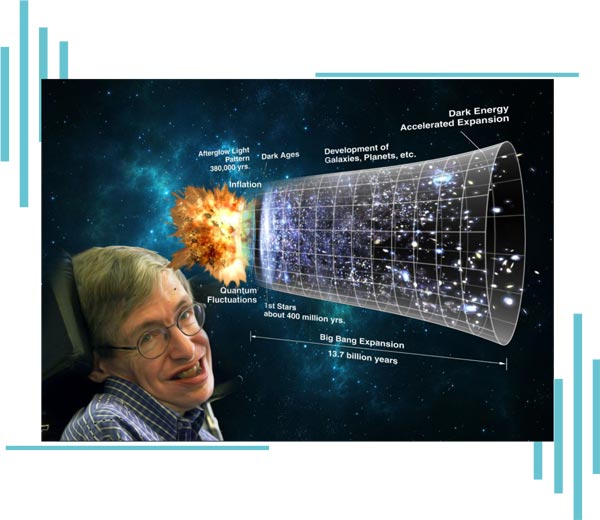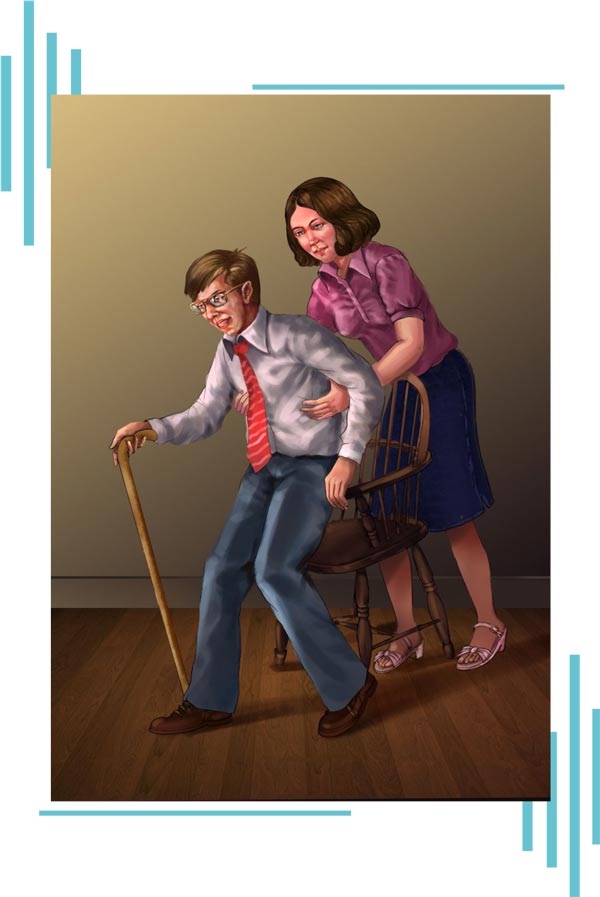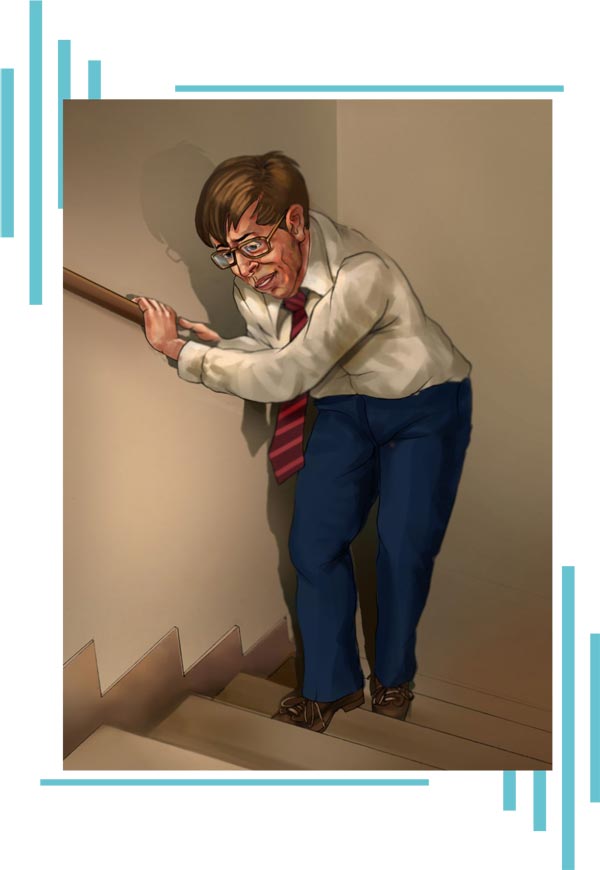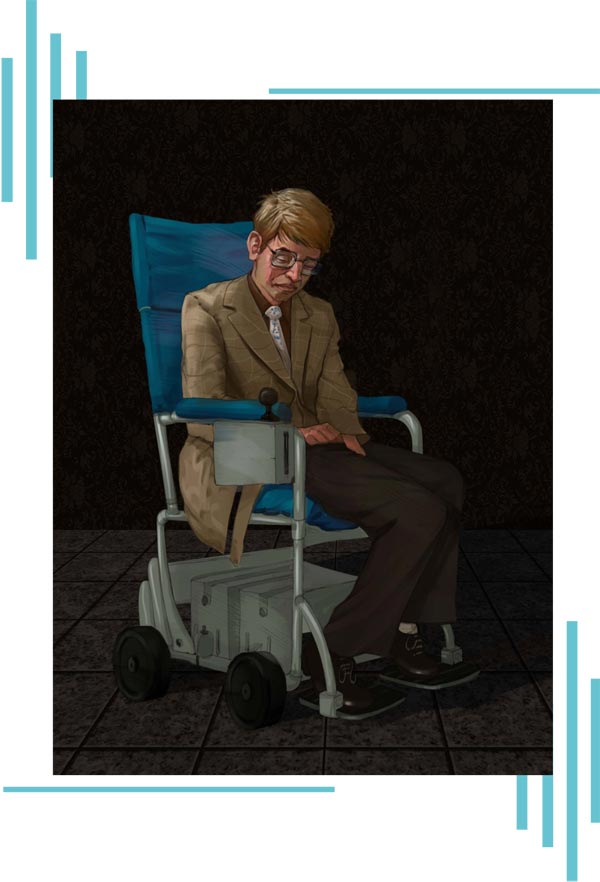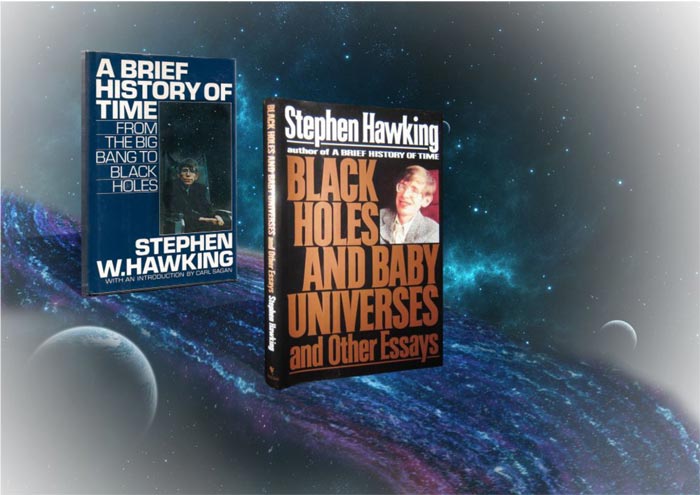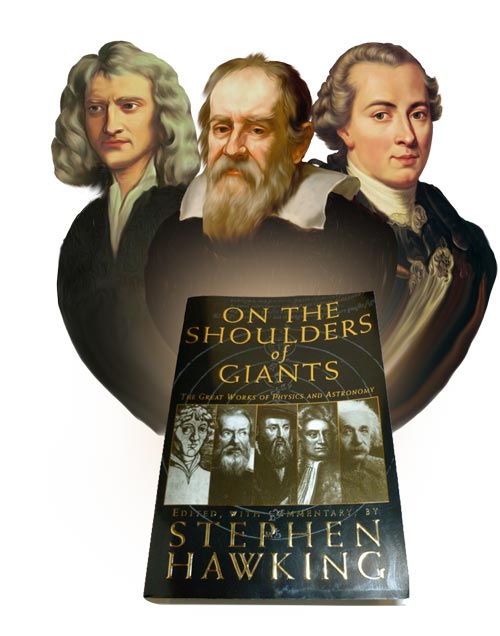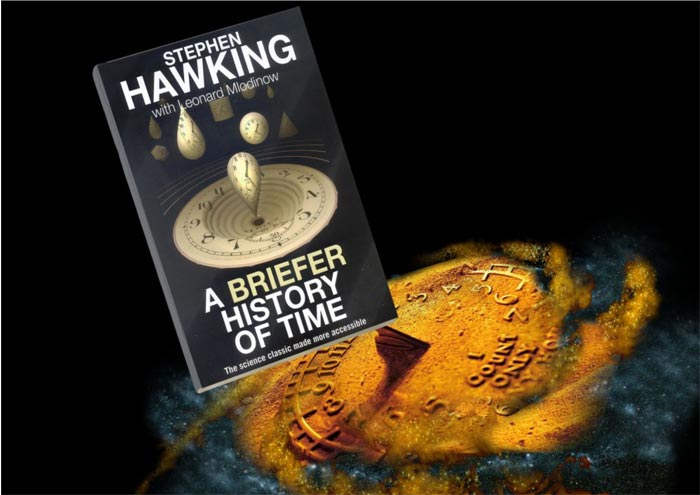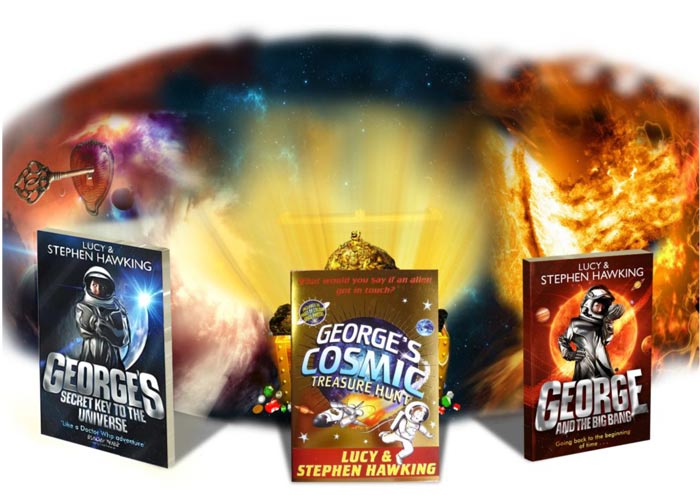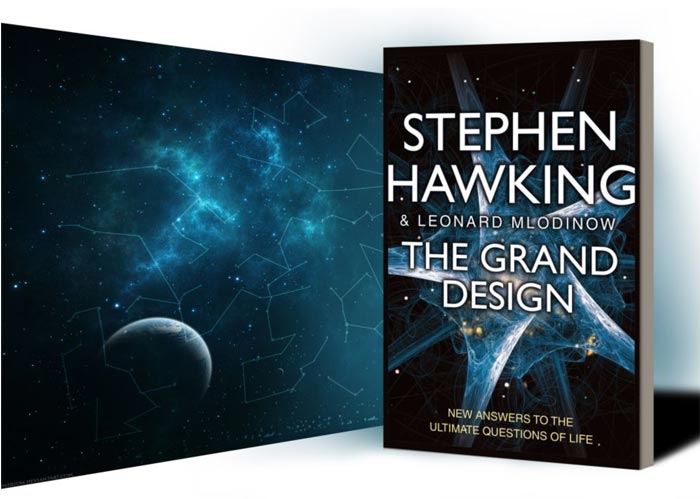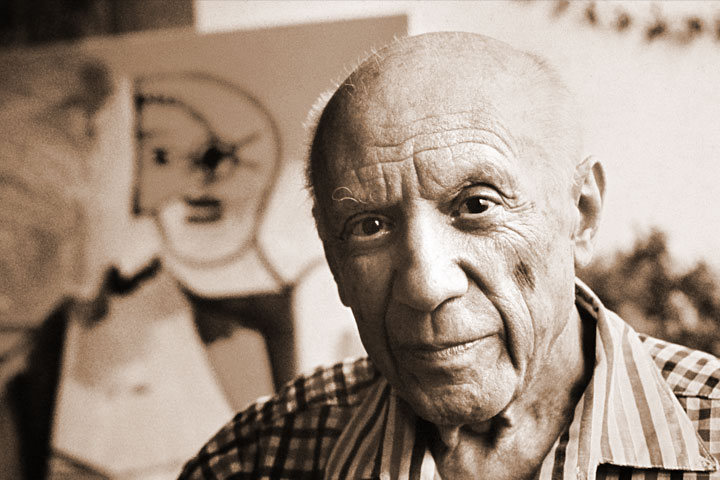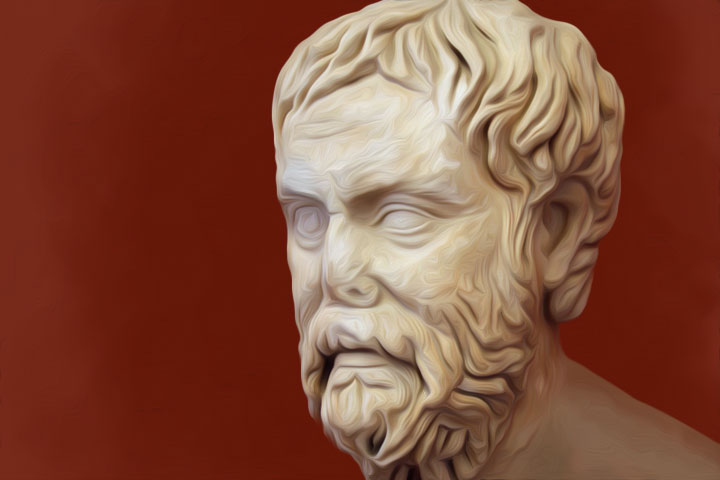
Ever tried blowing up a balloon? Breathing and puffing away to make it bigger…. remember how your cheeks ached with the effort? Now just imagine how it would feel to blow fifty balloons at one go? Or hundred? Sounds crazy, right? Doesn’t seem worth the effort, you might say. So you can leave the matter aside, you have a choice. But what if you didn’t have an option? What if you were solely dependent on twitching your cheeks to have any kind of contact with the outside world? Suppose it took ages for you to communicate a single ‘hi’ to someone. What if you couldn’t talk, walk or even move on your own your entire life. Can’t do much with a life like that, right? Wrong!
Sky is the limit for someone who possesses an indomitable spirit. And these aren’t just empty words. Not convinced… well… let me then introduce you to one such man. A man who has defied all odds and survived; someone who is living a life so rich, so spectacular, so full of successes that it deserves a salute. This man has written books, appeared on television and also has a movie based on his life…But who is he? Any guesses? Ladies and gentleman, this person is none other than the world renowned physicist, Stephen Hawking.
Afflicted by Amyotrophic Lateral Sclerosis (ALS) since his youth, he has gradually lost control over all his limbs, so much so, that he can’t speak even a single word on his own. ALS cost him his voice, his ability to move, but thankfully neither his brains and nor his will. There have been countless scientists through the ages and their discoveries have indeed been astounding. But what sets Stephen Hawking apart from the rest is his ability to achieve all that he has, inspite of his disability. This physicist wanders all over the universe while his body stays immobile in his wheelchair. But does our knowledge stretch beyond the wheelchair and the universe? Who is he? Has the wheelchair always been a part of him? Is there more to him than the bestseller ‘A Brief History of Time’? Read on to discover more about the mysterious Stephen Hawking.
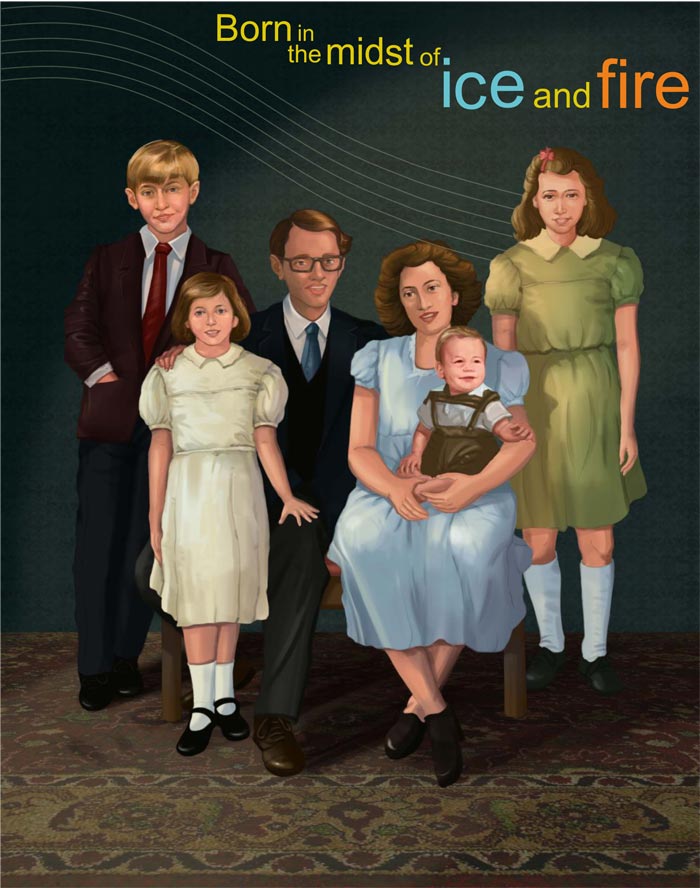
It was the winter of 1942. The sleepy city of Oxford lay covered in a cloak of security; World War II was underway but so far, Oxford and Cambridge, England’s centres of educational excellence had remained unscathed. On a cold January day, a very pregnant young woman could be seen strolling through the streets of Oxford. The young woman Isobel and her husband Frank Hawking had fled from their home in Highgate, London in search of a safe place for the birth of their first child and had fixed upon Oxford. Their son, Stephen, was born on January 8, 1942, exactly 300 years after the death of Galileo (an Italian physicist, mathematician, astronomer and philosopher). The timing couldn’t have been more auspicious; this much was clear, the stars had destined great things for the little baby.
Little Stephen was born into a family of thinkers. Both his parents came from humble backgrounds yet had gone on to study at Oxford. Isobel attended the famous university at a time when women were just beginning to pursue higher education. At Oxford, she studied Politics, Economics and Philosophy and after holding a slew of unsatisfactory posts, ended up as a secretary at a medical research institute. Meanwhile, Frank studied Medicine, specialising in tropical diseases and became a medical researcher at an institute in Hampstead. Here, the shy Frank fell in love with fellow Oxford student Isobel and the two were married. The Hawking family grew during the war, daughter Mary was born in 1943, a year after Stephen’s birth and Phillipa, five years later.

As a boy, Stephen was awkward and skinny with clothes that always bordered on messy. He did not shine in sports or handwriting nor did he learn to read properly until the age of 8. Frank’s work as a researcher took him annually to Africa where he would conduct first hand research on tropical diseases. Mary, Stephen’s sister, believed that fathers were “like migratory birds. They were there for Christmas, and then they vanished until the weather got warm.” Their father became the head of the Division of Parasitology at the National Institute for Medical Research, and in 1950 the family moved to St. Albans, Hertfordshire.
Here, the Hawkings bought a sprawling three storey brick house which was badly in need of repairs. The house boasted of peeling wallpaper, broken glass panes and a cool clime, thanks to the absence of a central heater. But whatever else the house lacked, it never lacked books. Piled in stacks throughout the house, books were the Hawkings’ most loved possession. Callers to the house recounted that the Hawkings were inseparable from their books; dinner time at their home was a very silent affair, with every one of the Hawkings eating with their noses buried in books.
They soon earned the tag of being an eccentric family. Their car was a second hand taxi; they kept bees in their basement and made fireworks in their greenhouse. The father spoke with a noticeable stutter and the children talked so very fast that they seemed to stumble on their words. Friends named their particular dialect as ‘Hawkingese’. Young Stephen also had an imaginary house in a place called Drane and he was forever trying to jump on buses to try and search for this fabled house.

At St. Albans, the 8 year old Stephen attended the High School for Girls which took boys up to the age of 10. One of the younger girls there was Jane Wilde; although they never met while in school, Jane would go on to play a major part in the boy’s life. At the age of 11, Stephen shifted to a free education at St. Albans school by scoring highly on his eleven plus examination. By this time, Stephen’s fascination with science and the sky had already begun. He would take apart clocks and radios to see how they worked, although he couldn’t always put them back together again. His mother, who along with her children often lay down in the backyard on summer evenings to look up at the stars, recounted, “Stephen always had a strong sense of wonder…And I could see the stars would draw him.”
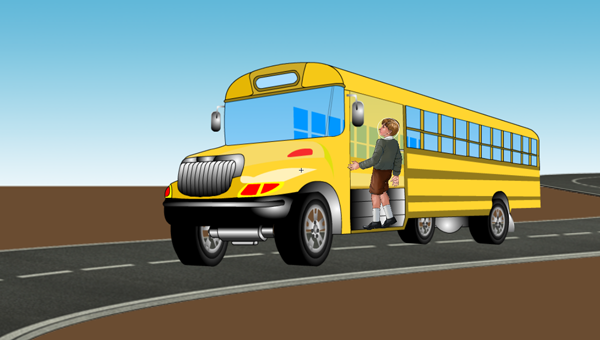
In school, he was recognised as clever but never especially brilliant. In one year, he was third from the bottom of his class. However, his classmates called him ‘Einstein’, a prophecy of things to come. He used to delight in creating complex board games which would last for hours and sometimes days. His friend, Michael Church believed that Stephen ‘loved the fact that he had created the world and then created the laws that governed it.’ His friends were divided over his ability to become a genius and one of his friends Basil bet another of his friends John a packet of sweets that ‘Stephen will turn out to be unusually capable.’
Meanwhile, Frank wanted to send his son to the esteemed Westminster School but private education was expensive and the Hawkings were not very rich. A scholarship was the only option available to Stephen; unfortunately, he fell ill around the time of the exam and had to continue at St. Albans school, where according to him, he received as good an education or better than I would have at Westminster. The illness was prolonged and he had to stay in bed for a long time. This ‘glandular fever’ was perhaps the first indication of the monstrous disease which would attack Stephen in his early adulthood. When he was 14, his parents adopted a son named Edward, who could never quite adjust with his elder siblings and his strange family, but Stephen opined that adopting Edward was ‘probably good for us. He was a rather difficult child, but one couldn’t help liking him.’
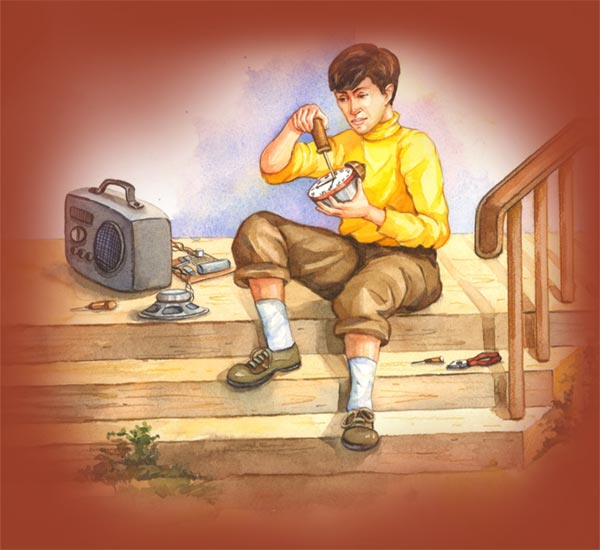
During his teenage years, Stephen graduated to building model boats and aeroplanes with his friend John McClenahan. They also explored mystic topics like extra sensory perception (ESP) but always with a scientific eye. In 1958, Stephen along with his friends, developed a basic computer called the Uniselector Computing Engine (LUCE) out of foraged parts from objects such as clocks and telephone switchboards, among others. In their last year of high school, they put together an improved version but even this could perform only the simplest mathematical functions. Unfortunately, LUCE was thrown away in the trash many years later by the school’s new, unsuspicious head of computing.
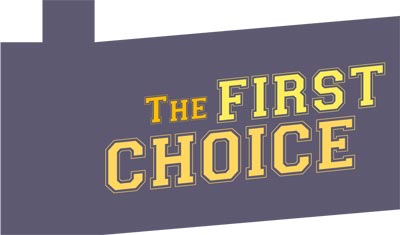
Time sped by on wings and soon Stephen was facing the decision of which college to attend and more importantly, which subjects to study. Much to his father’s disappointment, Stephen showed no inclination to follow in his medical footsteps. The youngster was decided that science was the field he wanted to study. However, a difficult choice loomed in front of him: which branch of science should he specialise in – Biology or Physics? He thought Biology to be too inexact, too descriptive while Physics was the most fundamental of all the sciences. Then again there was the class issue, Biology was supposed to be the territory of less capable students while Physics was earmarked for the intellectually elite. He was also interested in studying Mathematics, influenced by an inspiring teacher, Mr. Tahta from his school. Frank had his doubts about Stephen taking up a course in Mathematics as he felt that it would lead to a future of unemployment. Also, there was the question of which college he should attend. Frank was resolute that his son must attend his old college, the University College at Oxford University. Unfortunately, this college did not offer a major in Mathematics. Finally, Stephen worked out a compromise; he would study Physics and Chemistry at University College with some Mathematics on the side. Young Stephen was completely oblivious about the amount of trouble this arrangement would give him in the future.
The college was decided but the means to study there were lacking. Both of Stephen’s parents’ families could testify to the fact that an Oxford education did not come cheap; so it again came down to a scholarship, winning which, was crucial. Unfortunately, around this time, Frank was given a long-term exchange assignment to India for a year. The family left for India while Stephen stayed with family friends, the Humphreys and worked for his scholarship. His St. Albans’s headmaster believed that he should wait for another year as he was just 17 at the time. But Stephen was adamant; he would sit for the exams the same year. Determined, he gave the exams and scored quite well on all written work. He performed well in his interviews as well and in October 1959, at the young age of 17, Stephen headed for Oxford, scholarship in hand following in the path of both his proud parents

The young man from St. Albans arrived at Oxford at the beginning of the October term; at 17 he was far younger than the bulk of students in his year. This was owing to the fact that he had given his exams a year early and passed it and also because, most of his fellow students had completed the compulsory military service before joining; this draft had just been abolished and so Stephen was not required to undergo it. In those days, the culture at Oxford was not very conducive to knowledge. As Stephen recounts, “the prevailing attitude at Oxford at that time was very anti-work. You were supposed to be brilliant without effort, or accept your limitations and get a fourth-class degree. To work hard to get a better class of degree was regarded as the mark of a grey man – the worst epithet in the Oxford vocabulary.”
Friendless and surrounded by an all pervading atmosphere of boredom, Stephen was lonely and miserable during the first of his three years at Oxford. Everything seemed to conspire to keep him locked in a bubble of loneliness.
Even the Physics program of his year contained only four students. Soon, Stephen became close friends with his Physics tutorial partner, Gordon Berry. But then something happened in his second year, which completely transformed his college existence. He and Gordon entered the ‘The Boat Club’, the rowing team of the college as coxswains (the person who sits at the front of the boat and issues orders to the rowers). The members of The Boat Club were popular and Stephen soon found himself part of the hip crowd. Things changed for young Stephen and his Oxford friends remember him as lively, buoyant and adaptable. He wore his hair long, was famous for his wit and liked classical music and science fiction. So much different from the lonely, sad 17 year old who had entered the university only a year back!
The social side of Stephen’s life had started to look up and the study side did not give him much trouble either. Stephen found his Physics program ridiculously easy. One could get through without going to any lectures, just by going to one or two tutorials a week. You did not need to remember many facts, just a few equations. But his classmates vehemently disagreed. Derek Powney, his Physics classmate remembered an incident: once the four of them had been given thirteen homework problems in an Electricity and Magnetism course; their tutor Robert Berman had encouraged them to do as many as they could. After the end of a week, his fellow classmates had not completed more than two problems each; Stephen himself had not even made a start on them. But the next day, he skipped his lectures and completed ten problems on his own by lunch. Powney acknowledged that at that time they realized that it was not just that they weren’t in the same street, but weren’t on the same planet. Their tutor Robert Berman remembered Stephen as the most brilliant student he ever had. He recounted how Stephen would not bother buying many of the text books and also that he never took notes. He reminisces that “It was only necessary for him to know that something could be done, and he could do it without looking to see how other people did it…his mind was completely different from all of his contemporaries.”
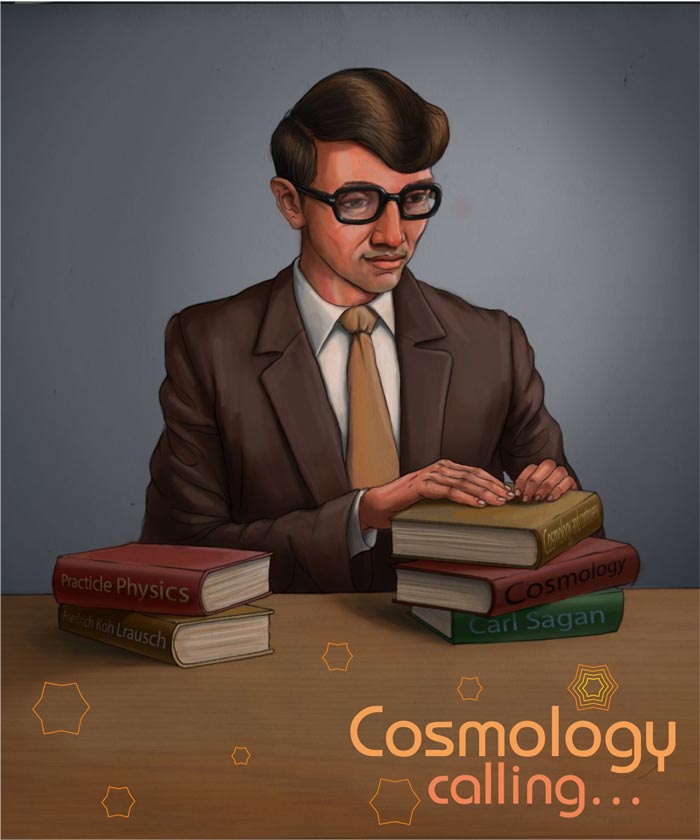
Time passed on and soon Stephen was in his final year at Oxford, facing yet another major decision – the area of specialisation for his Ph.D. He would continue in Physics, that much was certain, but what area should he specialise in? Should he go for Cosmology, the study of the universe at its most majestic or particle Physics, which looked at the universe on an infinitesimal scale? Stephen decided on Cosmology as he felt that particle Physics seemed like Botany; there were all these particles, but no theory.
On the other hand, Cosmology was built on a well-defined theory. Yet again, he was set on the subject, but the matter of the university remained undecided. There were no cosmologists on staff at Oxford. On the other hand, Cambridge could boast of the brilliant Fred Hoyle, an internationally reputed scientist who had become a household name through a series of radio talks on scientific topics. However, for a course at Cambridge, Stephen would have to receive a ‘first’ on his final exams. Stephen who had sadly neglected his studies over the past three years was unsure whether he would be able to qualify. Nonetheless, he sat for the exams but believed that he had not performed too well.
As a contingency plan, the young graduate student had applied for a job with the Ministry of Works. Unfortunately, he overslept (as usual) on the day of the exams and ended up missing them. But perhaps this was just as well, for he had underestimated his performance in his college exams. Far from failing, he achieved a borderline grade between a first and a second. So far, so good but this grade wasn’t final; there was supposed to be an interview which would determine his final grade. At this fateful interview he was asked about his plans after graduation to which Stephen replied matter-of-factly: “If I get a first, I shall go to Cambridge. If I receive a second, I will remain at Oxford. So I expect that you will give me a first.” His tutor Berman noted that the examiners then were intelligent enough to realize they were talking to someone far more clever than most of themselves. So, Stephen got his first and decided to join Cambridge in the fall term.
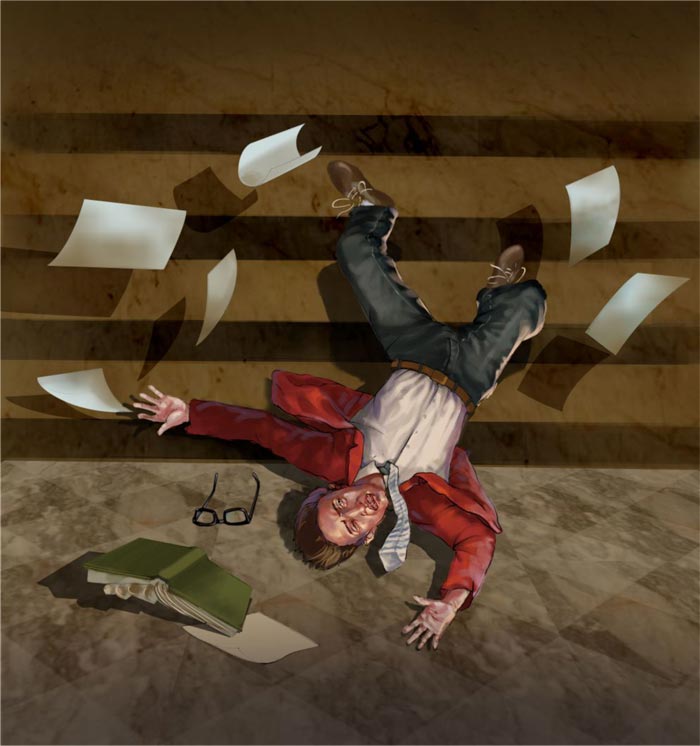
Life was perfect for the young man from St. Albans or so it seemed to him; but lady luck had other plans. During his last year at Oxford, he observed that he seemed to be getting clumsier and he fell over once or twice for no apparent reason. Though he did not disclose this to his family, he couldn’t hide it from his friends. Towards the end of his last term, he fell down a flight of stairs and landed on his head. He reportedly lost consciousness for a short time and also suffered from temporary memory loss.
Anxious, he took a Mensa intelligence test which proved that he had not suffered mentally. A trip to the doctor drew a blank on any physical injury; and Stephen decided to forget all about it.
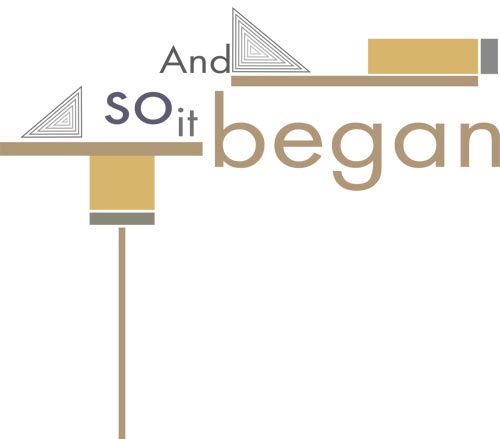
Full of high hopes, the young graduate began his term at Cambridge in the fall of 1962. Much to his disappointment, he was not able to study under the renowned Fred Hoyle who already had sufficient number of students under him. He was assigned to Dennis Sciama, another Physicist at Cambridge.
In the end, it all turned out for the best. Sciama, unlike Hoyle, was a homebody and was always available for discussion and direction. He was also known for his warmth and had a habit of putting his students’ needs before his own. But, Stephen had a tough time initially, partly due to his lack of grounding in Mathematics compared to other students and partly because of the absence of some problem on which he could work. Sciama suggested that he work on Astrophysics but Stephen refused; he was resolute to work on Cosmology and General Relativity (Albert Einstein’s theory which deals with the bending/warping of space-time because of the presence of matter and energy). He read up on the topic on his own and routinely commuted to London to attend the famous cosmologist Herman Bondi’s lectures on General Relativity. One more thing compounded the problem; the cryptic symptoms which had begun in Oxford came knocking again.
On returning home for Christmas, Stephen could no longer hide his growing clumsiness from his family and friends. Once during an ice skating trip with his mother, he fell down on the ice and couldn’t get up again. His panicked mother took him to a local café and wormed the whole story out of him. On his parent’s insistence he visited their family doctor who couldn’t find anything wrong with him but made an appointment for him with a specialist after the holidays. In the meantime, Stephen made the most of his break, attending parties and enjoying life with his friends. He attended one such party hosted by his old friend Basil King; also invited to this party was a shy girl called Jane Wilde. Jane listened avidly to the flamboyant graduate’s recital of Cambridge tales and at the end of the party the two exchanged names and addresses. She did not expect anything to come out of it and was vastly surprised when she received an invite for a party at the Hawkings house on January 8; Stephen’s birthday. Jane went to the party, nervous and flustered; she felt out of her depth at the celebration which comprised mostly of Stephen’s older graduate friends.
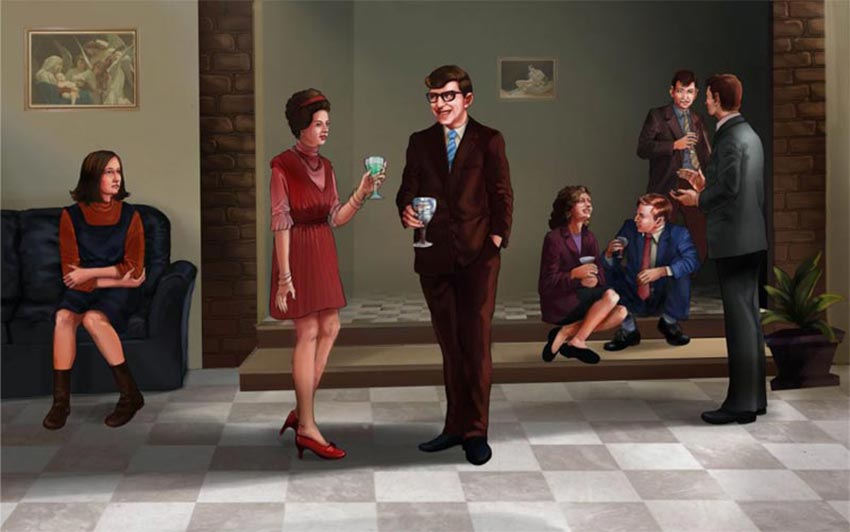
Why had Stephen invited her, a shy undergraduate to his birthday party? Jane did not know The New Year brought new worries for the Hawkings household. Soon after his birthday, Stephen had his appointment with the specialist and was admitted to St. Bartholomew’s Hospital, where his sister Mary was training to become a doctor. He spent two long agonizing weeks there, undergoing a battery of tests. In the end, the alarmed family was given the shocking news – Stephen was suffering from Amyotrophic Lateral Sclerosis (ALS). ALS – what is it? The ALS or Lou Gehrig’s disease is a baffling, incurable ailment which involves steady deterioration of the ability of the motor neurons to control the voluntary muscles of the body. Motor neurons are nerve cells in the brain, brain stem and spinal cord which function as the body’s control units and as important communication links.
Messages from motor neurons in the brain are transmitted to motor neurons in the spinal cord and from there they are transferred to the specific muscles. In ALS, the motor neuron cells wither or die and the communication between the neurons and the muscles comes to a dead end. Without any messages coming to them, the muscles cannot function and they slowly weaken and waste away. Eventually, the brain loses its ability to control voluntary movement. What Stephen had been suffering for over a year, the stumbling, the tripping, the slurring of the speech were all early symptoms of the onslaught of the disease.
The sufferers of this disease face a grim future. Arms and hands become weaker, making even simple tasks like turning a key or writing a chore extremely agonizing. Walking becomes progressively difficult and wheelchairs become a must. Speaking and swallowing also become painful and in the later stages even breathing becomes a fight. However, the involuntary muscles function as before and the heart, the sexual organs and the muscles involved in digestion and waste elimination remain untouched. Most importantly, the patients mind is unaffected. However, most of them die within two years; though some have been known to live for years, with younger and male patients living the longest.
The doctors painted a grim future to the stunned graduate and his family. Stephen was in shock and went into depression. “Why should this happen to me?” he would ask himself. “Why should I be cut off like this?” However, while he was lying in the hospital, listless and depressed, he watched a young boy die of leukaemia in a nearby bed. It made him realize that there were others whose fate was even harder than his. It also made him feel something akin to panic, there was such a lot to do, his life had been one of boredom and he suddenly realized that if he were reprieved, there were a lot of worthwhile things he could do. Several times he thought of giving himself away for others as he thought if he was going to die anyway, it might do some good. But a deep lethargy had him in his grip and he couldn’t find anything to interest him in life. His doctors encouraged him to continue with his studies but what was the point? ‘If I am going to die anyway, what difference does it make if I study or not?’ he would think. Life had become a nightmare for the bright young man and what was more, it was soon about to end. Couldn’t anyone save him? Powerless and terrified, Stephen turned to his father, the expert in tropical diseases. Frank Hawking investigated every conceivable lead, every link, however obscure, but his search was in vain. Defeated, Stephen decided to return to Cambridge, studies and death.

Meanwhile, Jane had taken up a secretarial course in London where she used to commute every day. Near the end of Stephen’s stay in the hospital, she met a friend of hers, Diana King, who was now a nursing student. Diana told her about Stephen’s ailment; Jane was shocked to hear about the sad plight of the young man whom she had found so fascinating. The news affected her with a strange intensity; she became silent, hugging her grief to herself. Her altered behaviour was detected by her mother who told her to pray for Stephen as there was nothing else they could do for him.
One day, Jane met Stephen unexpectedly at the train station; she was commuting to London for her secretarial classes and Stephen was on the same train returning to Cambridge. Jane was surprised to find that not only did Stephen seem glad to see her but he was also in a relatively sunny mood. She did not have time to ponder about it as she was completely absorbed in him as he was in her.
London came too soon for the couple; there was so much still left to talk about. The two unwillingly parted ways but not before making plans for their first date – dinner at an upmarket Italian restaurant and tickets to the theatre. And so began a gradual courtship; the young couple would go out on dates, each followed by a period of absence. Every time that Jane met Stephen, she would silently despair at his continuously deteriorating condition, yet, at the same time realize how deeply she had come to care for this young man with the unruly golden brown hair. She knew she would most likely end up with a broken heart but she just couldn’t get him out of her mind.
She burned to help him out of his tragic fate; she tried researching on ALS but it proved fruitless. She would pray for him, worrying that his lack of faith would destroy them both. In the end, she grew philosophical; after all, there was no guarantee to anyone’s life. Disheartened, she prepared for her first term at Westfield College, London, where she planned to study Spanish and French. Their dating continued and they would meet in London sometimes when Stephen came for the general relativity seminars; Jane would also visit Cambridge on several weekends. Stephen refused to discuss his disease with Jane and understandably he never thought about their relationship in the long-term. With her relationship on rocky grounds, Jane left for a term in Spain in April 1963. While there, she frequently wrote to Stephen but he never answered her letters.
The summer of 1963 found Jane holidaying in Europe with her parents while Stephen was attending the celebrated Wagner festival in Germany with his younger sister Philippa. Absence makes the heart grow fonder and the young couple was no exception…their relationship blossomed swiftly once they both returned to St. Albans at the end of the summer. So much so, that in October, Stephen proposed to Jane who gladly accepted and cheerfully gave up her career plans for the sake of their future together. As was customary in those times, Stephen formally asked George Wilde, Jane’s father, for his daughter’s hand in marriage; George consented but put in the condition that Stephen would not make unreasonable demands on his daughter. Frank Hawking, in turn, warned Jane that Stephen had not long to live; but Jane was resolved to marry Stephen and was willing to accept the responsibility of handling the household duties and taking care of Stephen single-handedly. In return, all she wanted from her future husband was that he should love her. Stephen was blissfully happy and often acknowledged that the engagement “changed my life. It gave me something to live for.”
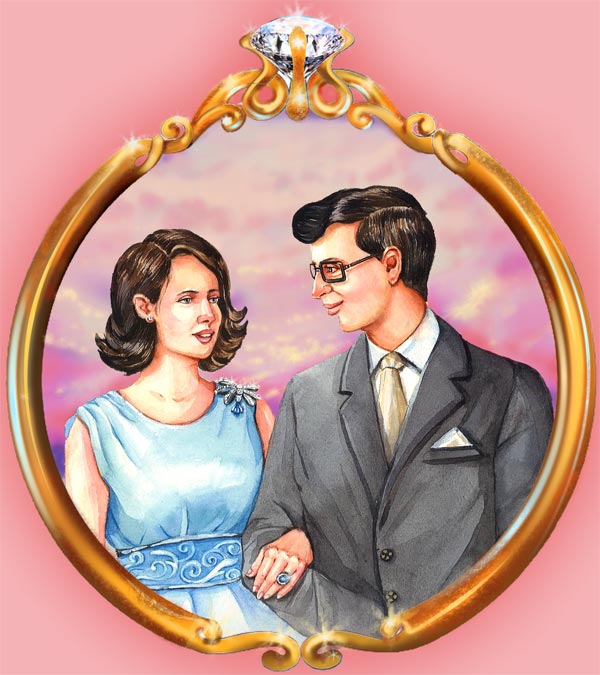
So far, so good; the young couple had managed to allay their parent’s fears but there were still two major obstacles to be overcome before they could get married. One, Westfield, the college where Jane was studying, did not generally allow its undergraduates to get married. But a special concession was made for her as there was a possibility that Stephen might not live till after her graduation. Second, Stephen needed to find a job to support them. That meant deciding on a research topic, completing his research and applying for a job. So, for the first time in his life, Stephen would have to actually work hard at his studies. To his surprise, he found that he quite liked it.
Where there is a will, there is a way; with life beckoning him forward, Stephen soon found his elusive research topic quite unexpectedly. In January 1965, he learned about a theory proposed by Robert Penrose, a Physicist, on dying stars. As per Penrose’s research, when a massive star dies, it collapses into a black hole. (Black holes are objects with such strong gravity fields that not even light can escape from them). Stephen had always thought differently than those around him. Now he set to thinking ‘What if he reversed this theory? What if at the beginning of the universe, space, time and the entire mass was concentrated into a single point or a singularity? Suppose it exploded and gradually expanded into the universe that we know today?’ The young Physicist went to work and using Penrose’s techniques he developed several models of the universe. For once, he remembered the practical side of life as well and applied for a research fellowship at Gonville and Caius College (part of Cambridge) in February 1965. Hermann Bondi and Fred Hoyle provided the necessary references and Stephen began his duties as a research fellow in October 1965. Stephen and Jane were wed in a civil ceremony on July 14, 1965, followed by a religious service at the chapel of Trinity Hall, Cambridge. After a brief inexpensive honeymoon in Suffolk, the young couple began their married life.
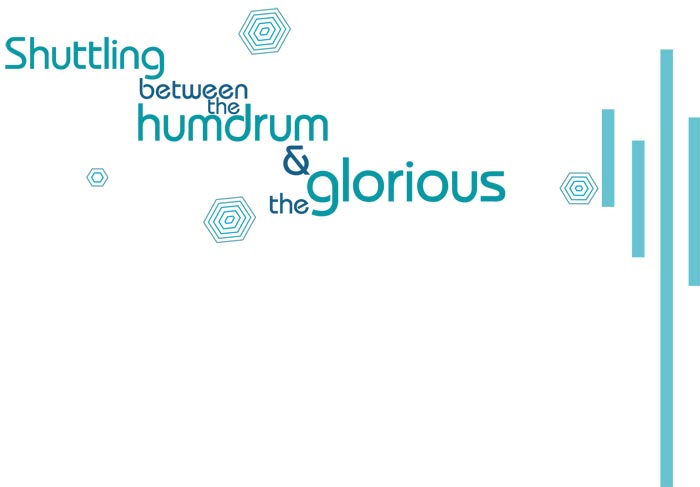
The couple rented a small house near Stephen’s office so that he could walk to office on his own. During the weekdays, Stephen stayed alone in their house while his student wife boarded at her rented room at Westfield. Jane would return home for the weekends and would get right to work, putting things in order and typing out Stephen’s thesis. Meanwhile, Stephen had started feeling the lack of his mathematical education sorely; he put his brains to work and soon came up with a novel way to improve his mathematical knowledge while earning some money at the same time. He began supervising an undergraduate math course for the college, teaching himself what he lacked on the way!
In the meantime, Jane completed her graduation and decided that if she was to be of any help to her husband she needed to first find some identity and purpose to her own life. With this in mind, she decided to pursue a Ph.D. Knowing her husband’s condition, she selected a topic which could be easily researched through secondary sources. This was just as well, for in the autumn of 1966, she found that she was pregnant. Stephen’s condition was also worsening steadily; his fingers had started to curl, making writing a difficult task. At his father’s urging, he started taking vitamin B injections once every week. His old mentor, Dennis Sciama convinced the Institute of Physics to fund physical therapy twice in a week at the Hawking home in order to control the steady debilitation of Stephen’s health. Between caring for Stephen and the imminent arrival of their child, Jane found little time to work on her thesis. On May 28, 1967, the Hawkings welcomed their first child, Robert George Hawking, into the world.
The baby brought good fortune along with it; Stephen’s research fellowship was renewed for another two years and his reputation as a Physicist also grew steadily. Stephen began working on the Big Bang (a theory dealing with the creation of the universe as a result of huge explosion some 14 billion years ago) with his colleagues and realized that it could be proved that the entire universe had emerged from a singularity.
The young Physicist was completely absorbed in his work and later recalled that it was a “glorious feeling having a whole field virtually to ourselves.” He, along with the famous mathematical physicist Roger Penrose, wrote an essay on the beginning of time which was awarded second place in Gravity Research Foundation Award, 1968. But trouble managed to keep up with the family. In 1969, Stephen’s research fellowship which had already been renewed once was about to be terminated. With his incoherent speech and his physical condition, he could not hope to get a teaching job anywhere. A rumour started doing the rounds that King’s College was about to offer Stephen a Senior Research Fellowship. This worked as a blessing in disguise for Stephen as Gonville and Caius, not wanting to let go of its rising star, hurriedly offered him a special Fellowship for Distinction in Science with a six year contract
On the home front, in early 1970, Jane found herself pregnant once again. Her thesis work took a backseat yet again as family matters took centre stage. On November 2, 1970, the second Hawking child, Lucy was born. Jane was a harried young housewife now; to care for a toddler, a new-born and a disabled husband single-handedly was not an easy task. Stephen’s condition needed more assistance day by day.
He could still climb up the stairs by pulling himself up using the banisters but his gait had become so unstable that he was soon relegated to a wheelchair. Dressing in the morning and undressing at night had become major tasks but he still insisted on doing them himself.
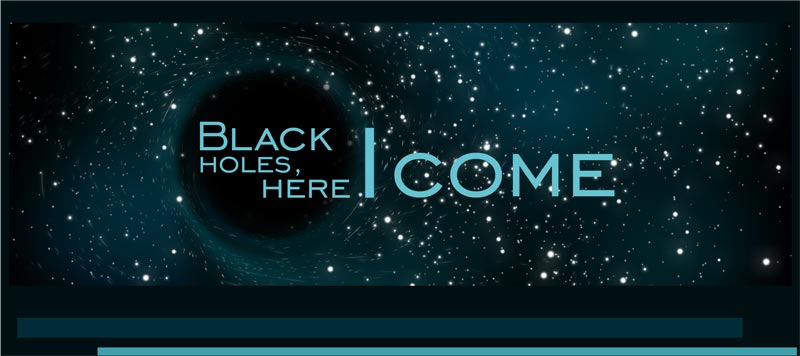
Stephen’s fascination with black holes led him in deeper and deeper into discovering their mysteries. He revolutionised the thinking about black holes and came up with what was called by some as the ‘black holes have no hair’ principle. Simply said, it meant that whatever the initial material which went into making a black hole, once created, it could be described entirely by only three properties – its mass, overall electric charge and rotation. So, technically speaking, a black hole created out of an elephant, a young girl and a bar of soap would appear identical – there would be no way of distinguishing the original material. On the basis of his research, Stephen wrote a paper on black holes for the annual Gravity Research Foundation Award in January 1971 and was awarded the top prize.
The pleased Physicist used the prize money to buy a new car.However, not everything was as rosy as his life at work. The Hawkings struggled against the physical and emotional barriers in the British society against the disabled. The high curbs, the endless stairs, the lack of wheelchair accessible places, all schemed against letting the family live a normal life. Jane and Stephen actively fought for the rights of the disabled and they also won victories, for example, the university gradually made the campus more wheelchair-friendly and the Arts Theatre and Cinema added seating areas for wheelchairs.
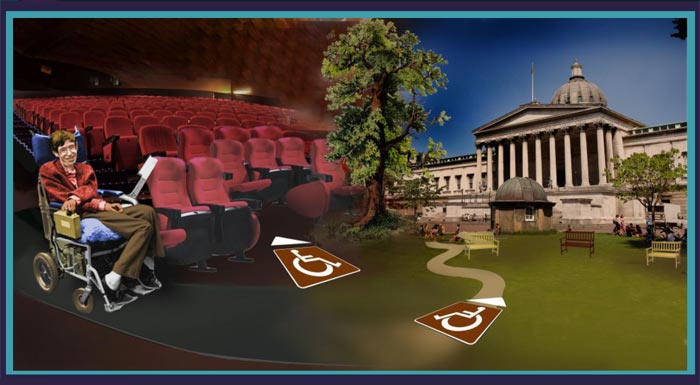
Jane later noted that by a curious coincidence, the attitude of the City Council towards access for the disabled mellowed rapidly as Stephen’s fame grew. The Hawking children were growing up as well. Robert had started school and although he shined in Mathematics, he had problems with reading, just like his father. Jane suspected that her child was dyslexic and that he should be enrolled into a private school where he would receive education better suited to his needs. But where was the money going to come from? The Hawkings certainly could not afford a private school education on Stephen’s college salary. Luckily, Stephen’s father stepped in with a family inheritance and Jane and Stephen used this money to buy another house which they let out on rent.
Stephen’s research was also moving in a new direction, that of quantum gravity – the uncomfortable, elusive coupling of General Relativity with Quantum Mechanics (the study of matter at the atomic or minute scale). Scientists world over were puzzled over the unresolved quantum gravity theory, thought to be ‘the theory of everything’. In the meantime, a trip to Russia along with Jane and friend Kip Thorne and a meeting with famous Russian theorist Yakov Zeldovich led Stephen to ponder on the question, “Do black holes radiate?” Stephen’s mind had found a new toy to play with but while his mind was busy roaming the unexplored realms of the universe, his body was deteriorating day by day. Many people now were unable to understand his increasingly slurred speech. Slowly, he was becoming dependent on others for every small physical activity. Even the stairs which he earlier used to manage on his own, had now become an impossibly tough task.
Undaunted, Stephen pressed on with his research. He had earlier rebuffed claims of Jacob Bekenstein, a graduate student at Princeton University regarding black hole radiation. Now he found that this was indeed the case. What was more, he found that the rate of radiation was inversely proportional to the mass of the black hole, which meant, that smaller the black hole, the faster will it radiate away. As the black hole got smaller and smaller, a time would come when it would burst into a shower of gamma rays releasing energy equivalent to a million megaton thermonuclear weapon! This discovery put Stephen on the international research map. What was even more astonishing was the fact that most of his ground-breaking calculations were done in his head. Kip Thorne explained, “because the loss of control over his hands was so gradual, Hawking has had plenty of time to adapt. He has gradually trained his mind to think in a manner different from the minds of other Physicists. He thinks in new types of intuitive mental pictures and mental equations that, for him, have replaced paper-and-pen drawings and written equations.” Stephen himself put it more modestly; he believed that, most people have the mistaken impression that Mathematics is just equation. In fact, equations are just the boring part of Mathematics. And he attempts to see things in terms of geometry.
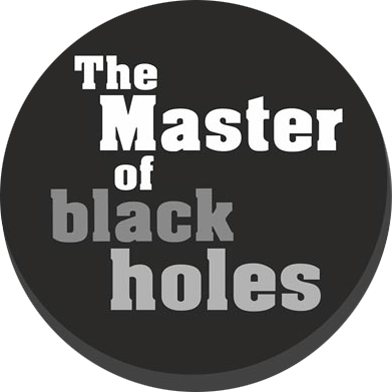
The year 1974 proved to be an auspicious one for the Hawkings. In May 1974, shortly after his work on black hole radiation, Stephen was inducted to the prestigious Royal Society (a very old learned society for science based in London which acts as scientific advisor to the British government). He was one of the youngest members in its history. It was a tradition that new inductees walk to the podium and sign their name in the official roll book; however, Stephen’s physical condition made it extremely difficult for him to perform either of these tasks. The President, Sir Alan Hodgkin, a Noble laureate in Biology, himself brought the book to Stephen who signed it with great difficulty. In the spring, the young Physicist also received an invitation from California Institute of Technology (Caltech) offering him the ‘Sherman Fairchild Distinguished Scholar’ visiting professorship for the academic year 1974-75. The position proved to be a godsend as it not only included a healthy salary but also an electric wheelchair for Stephen, facility for all other medical needs as well as appropriate schooling for the children. Everything was taken care of except for Stephen’s general care. Jane was finding it increasingly difficult to care single handed for a severely disabled husband and their children. No one was offering to help them and they couldn’t afford paid help. Also, she knew that she could not ask for help from others as that would force Stephen to let his guard down and allow others to see the gravity of his condition and his courage might fail him.
Jane hit on an ingenious way out; if one or more of Stephen’s graduate students moved in with them, her load would lessen and Stephen would always be in the care of someone he trusted. This was decided and the Hawkings set off for sunny Caltech with Bernard Carr in tow. Stephen’s fascination with black holes led him to what was to become the driving force of his entire career – the unification of general theory of relativity with the theory of Quantum Mechanics, something that had eluded even the great Albert Einstein. Stephen’s goal was a complete understanding of the universe, why it is as it is and why it exists at all. The warm and sunny Caltech offered the perfect foil for this work and it was here that Stephen proposed another of his controversial ideas – the black hole paradox. We know that black holes have no hair and after its creation a black hole can be defined only by its mass, electric charge and rotation. Information about the material which formed the black hole must be securely locked away inside the black hole, though it would be inaccessible to an outside observer. But what if a black hole radiated and eventually exploded?
Stephen showed that the information contained in the black hole would die with it and as such it would be forever lost to the universe. This was in direct contradiction to the predictions of Quantum Mechanics. This work created a lot of uproar in the scientific community. There were many who believed that it was our incomplete understanding of nature which made it seem that there was a paradox, but Stephen was adamant and maintained that there was an inherent flaw in Quantum Mechanics. However, not all time in Caltech was spent in disagreements and differences. While there, Stephen and Kip entered into a friendly gamble which went on to become legendary. The bet was made on Stephen’s favourite creatures – the black holes. Countless scientists had been theorizing on black holes but so far there had been no observational evidence to support the existence of these dark monsters. In 1971, sighting of one Cygnus X-1 supported the probability of it being a black hole. By the mid-1970s, there were many who were willing to bet that Cygnus X-1 was indeed a black hole. Stephen and Kip went one further and actually made a written bet which was printed and signed by both parties on December 10, 1974, and kept at Kip’s office at Caltech. The wager read:
“Whereas Stephen Hawking has such a large investment in General Relativity and Black Holes and desires an insurance policy, and whereas Kip Thorne likes to live dangerously without an insurance policy,
Therefore be it resolved that Stephen Hawking bets 1 year’s subscription to ‘Penthouse’ as against Kip Thorne’s wager of a 4 year subscription to ‘Private Eye’ that Cygnus X.1 does not contain a black hole of mass above the Chandrashekhar limit.”
Stephen bet against Cygnus X.1 because if it did prove to be a black hole, he would have the satisfaction of knowing that his work had not been in vain and if it wasn’t, he would at least get the magazine subscription.
Stephen’s popularity continued to soar and he received several awards while at Caltech. One of these was the Pius XI Gold Medal for Science from Pope Paul VI which was awarded to young scientists who had done notable work. It was ironical that in 1663 Galileo was condemned by the Church as ‘vehemently suspected of heresy’ when he had supported the findings of Copernicus who believed that the earth was not the centre of the universe. Surprisingly, now, a scientist born exactly 300 years after Galileo’s death was being awarded by the Vatican for work which would prove to be every bit as revolutionary. The irony was not lost on the young physicist but he used this opportunity to make a special plea for the rehabilitation of Galileo’s memory. Stephen’s appeal did not go in vain, though it took some time. Four years later, Pope John Paul II announced the Vatican’s decision to reopen the case of Galileo. Meanwhile, California’s sunny atmosphere had brushed off on Jane as well; she joined a chorus and found the experience to be an intoxicating compulsion to my generally banal existence.
At the end of the year, the Hawkings returned to Cambridge. Stephen had grown accustomed to the fast electric wheelchair which he had used in Caltech and he found it to be an extremely liberating experience. Back in Cambridge, as was within his rights, he applied for the same to the Department of Health. The department refused his request and asked him to apply for the three wheel electric chair which he had used earlier. However, Stephen’s physical condition had worsened since then and he was not strong enough to operate such a device now. Helpless, the Hawkings had to dive into their personal savings and purchase the much needed electric wheelchair on their own.
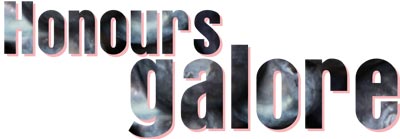
However, to compensate, other rewarding things took place. There had been rumours that Stephen planned to permanently settle in California now that his six year fellowship contract with Cambridge had come to an end. Just as before, the university hastened to offer him a job, this time his first official post, that of a readership (an academic rank above senior lecturer awarded for a distinguished record in original research). At home, Jane had resumed work on her long neglected thesis. She also managed to squeeze in time to attend voice lessons once in a week. Spring 1976 saw both children down with chicken pox and the parents bogged down by severe sore throats and fever. Stephen’s condition worsened but he resisted seeing a doctor. However, as a birthday present to his wife, he hesitantly allowed a visit by the family doctor. The doctor came and Stephen was speedily whisked off to the hospital. Although he returned back in a few days, he was very weak and was constantly plagued by choking fits. Jane fell into depression; she could see no way how the family could continue to care for Stephen without any outside help.

Somehow, she willed herself to go on.
During this time, Don Page, a graduate student who had worked with Stephen at Caltech, shifted to Cambridge and moved in with the Hawkings. Though Don and Stephen were compatible in Physics they were poles apart in everything else. While Stephen was a die-hard atheist, Don was a devout Christian. When he first moved in with the Hawkings, Don tried to change Stephen’s thoughts about religion but he quickly gave it up as a lost cause. However, having Don at home proved to be a blessing for Jane. It left her free to stay at home while Don accompanied Stephen on his work related trips. During the summer of 1977, Stephen went back to Caltech for several weeks and continued his work on quantum gravity. When he returned home, he was promoted to a special chair in gravitational Physics. He was now a professor and was given a salary raise in consequence. Jane joined the local St. Mark’s church choir which was directed by one Jonathan Hellyer Jones. Jonathan who had lost his wife 18 months earlier to leukaemia soon became good friends with Jane and began visiting the Hawking home. He taught Lucy to play the piano and also volunteered to help Jane with Stephen’s needs. Jane was happy; she had found a much needed friend and also another pair of willing hands to help with Stephen.
Accolades continued to pour on Stephen and with the awards came increased public recognition and scrutiny. The media was as interested in Stephen Hawking - the man with the ALS as in Stephen Hawking - the Physicist. In September, Jane was pregnant once again; she was determined to complete her thesis before the baby’s arrival the following spring. Having Jonathan to help her made this at least a remote possibility. In April 1976, on Easter Sunday, the Hawkings welcomed their third child into the world, Timothy. The joy of the baby was followed by more good news. Stephen was appointed to the esteemed Lucasian Chair in Mathematics at Cambridge, recognised as being one of the most honoured academic posts in the world. This chair of which Stephen was the 17th holder was once held by none other than Sir Isaac Newton. The chair came with a strange but rather fitting decree – the holder must not be active in the church!
1980 arrived on a gloomy note when Stephen went down with a stubborn cold which quickly turned serious. Jane was not well either, caring for her new-born baby and her ill husband were taking a toll on her health. On the advice of their family doctor, Stephen was taken away to a nursing home so that both Stephen and Jane could have some time to rest and recuperate. While his health was recovering, the then Plumian Professor of Astronomy, Martin Rees, had a meeting with Jane regarding Stephen’s worrying condition. He offered to find funding to provide some nursing care for him. At first, Stephen was annoyed at this increasing lack of privacy but later he came to realize that it would actually make him independent of his family and they would also get some rest. Though Jane tried her hardest to keep things as normal as possible for her children, they were always painfully aware that their family was different from other families. Their father was a permanent fixture in his wheelchair since their childhood and he could never perform activities that a normal father could, like playing with them or indulging in a bout of rough and tumble. It was considered a special treat, if their father could be persuaded to wiggle one of his ears. Also, they had to contend with rude stares of passer-by’s and Lucy would counter by staring back at them to see how they liked it.
On April 29, 1980, Stephen took his seat as Lucasian Professor of Mathematics. As was the tradition there, he made an inaugural speech which was read by one of his students “Is the end in sight for Theoretical Physics?”, wherein he stated that he expected a complete unification between Quantum Mechanics and General Relativity by the end of the twentieth century. More than a year after he had taken office, it was realized that he hadn’t signed a ‘big book’ which every university teaching officer was meant to sign. The book was brought to Stephen’s office and he signed it laboriously. He reminisces, “That was the last time I signed my name.” Meanwhile, Jane officially graduated in April 1981 and took up a part time job at Cambridge Centre where she readied students for their university entrance exams. Finally, she had found an activity which utilized her skills and also let her find time for her husband and children.
In 1981, Stephen received the Benjamin Franklin Medal in Physics in Philadelphia; previous awardees included Albert Einstein and Edwin Hubble. In his speech, he talked about the pileup of nuclear weapons in the US and USSR and of the dangers they posed to human life. In February 1982, Stephen became a Commander of the British Empire. The ceremony was held at Buckingham palace with Queen Elizabeth doing the honours while Stephen’s son Robert acted as his father’s assistant.

In the spring of 1982, the Physicist gave a few lectures at Harvard on gravitational collapse, the implosion or internal collapse of a star or any other celestial body as a result of its own gravity. It set him to thinking, why couldn’t he write a popular level book on his research? He was confident that “nearly everyone was interested in how the universe operates but most people cannot follow mathematical equations. I don’t care much for equations myself. This is partly because it is difficult for me to write them down.” However, there was a practical reason behind this decision as well. Their daughter Lucy was now 11 years old and she, like her brother Robert before her was sure to benefit from attending a private school. But private schools were expensive; the prospective book might just provide the much needed money. To this end, Stephen began working on the manuscript and concluded the first draft in 1984. Then started the quest for a suitable publisher. All his previous books had been published by the elite Cambridge University Press. But this was not going to be a heavy academic tome; it was to be lighter, more suited for the general public. Stephen wanted a publisher who had experience in marketing popular level works and after much searching, he finally decided on Bantam books.
Around this time, Stephen found his personal life suddenly turned upside down. Jane confided to him that her relationship with Jonathan had moved on from friendship to love. But she had no plans of disrupting their family life. She later wrote about this period: “Stephen said he would not object so long as I continued to love him. I could not fail to love him when he showed such understanding…At the time I felt very guilty but [Jonathan] was a godsend. We were rarely alone together and tried to maintain our code of conduct in front of Stephen and the children, suppressing displays of close affection…Jonathan and I had struggled with our own consciences and had decided that the greater good – the survival of the family unit, Stephen’s right to live at home within that family unit and the welfare of the children – outweighed the importance of our relationship.”
Everyone involved were so discreet that few outsiders came to know about this arrangement. That summer the whole family travelled to Europe. Stephen, his secretary Laura Gentry and several students and nurses were heading to the Conseil European pour la Recherché Nucleaire (CERN) at Geneva while the rest of the family holidayed at Lake Geneva. Robert was the exception; he was on his way to Iceland for a Venture Scouts expedition. Jane, Jonathan and the two younger children would be camping their way across Belgium and Germany and meeting up with Stephen’s team at Bayreuth, Germany. On her way, Jane called up Stephen to check on him and was horrified to hear from Laura that her husband was seriously ill and was in the hospital on life support.
The family rushed to the hospital to find that the persistent cough which had started when Stephen was on a trip to China had developed into pneumonia. The doctor had put him into a drug induced coma and he was breathing through a respirator. Jane was beside herself with worry, misery and guilt. “How could I have ever let Stephen go off alone with his entourage, deprived of my intimate knowledge of his condition, his needs, medicines, dislikes, allergies and fears?” The doctor, unaware of Stephen’s zest for life asked Jane if she wanted him to be disconnected from life support and allowed to die. Jane was horrified and was adamant that no such thing should be done. The doctor then discussed the alternative. Stephen would have to undergo a tracheotomy; this would mean a permanent hole being cut in his trachea below his vocal chords. On the plus side, his coughing spells would end but the operation would take away whatever muddled speech he had left to him. Also, he would require constant nursing for the rest of his life.
When Stephen’s health stabilised, the university paid for an air ambulance to fly him back to Cambridge. Once there, the ailing physicist was admitted to Addenbrookes Hospital where several unsuccessful attempts were made to wean him off the respirator, but in the end the tracheotomy had to be performed. During these times, Stephen used to have vivid dreams of flying away in a hot air balloon which seemed a hopeful sign to him. The operation was a success and Stephen’s health started improving. But there was a big price to pay…how would Stephen communicate with anyone when he couldn’t speak or write? At first, he would spell out words slowly and painfully one word at a time by raising his eyebrows when someone pointed out the correct letter on an alphabet card. But this was not easy and he later recalled that it was “pretty difficult to carry on a conversation like that, let alone write a scientific paper.”

Fortunately, science came to the rescue. Walt Woltosz, a computer expert from California had developed a program for his disabled mother-in-law which selected words from a dictionary menu and had a built-in speech synthesizer. Walt sent this program to Stephen; a few tweakings later it was ready for Stephen. This was a giant leap for the physicist as for the first time in years he could write and speak, albeit in a robotic, emotionless voice and with an American accent. But this was not the end of their troubles, a mammoth problem still persisted. All day round nursing would be a huge expense and the Hawkings really couldn’t afford it.
However, help was on its way; friend Kip Thorne suggested that they contact the famed John D. and Catherine T. MacArthur Foundation, which was one of the largest charitable organisations in the United States. One of the committee members was the well-known particle physicist, Murray Gell-Mann. The foundation granted the Hawkings request but on a trial basis, providing just enough funds to cover the continuous nursing care. The family now had the money and Jane and Laura set about putting together a team of nurses to cover three shifts per day. The work was demanding and many nurses came and went. Finally, a team of long-term nurses emerged; one among them was Elaine Mason. It was her husband, David, a computer engineer who dexterously mounted Stephen’s computer, screen and speech synthesizer on to his wheelchair.
By Christmas, Stephen was able to return to his work. Much to his joy, he found that now he could communicate with his colleagues and students much more effectively than before. Public appearances which earlier meant sitting passively while one of his students read his prepared talk suddenly became much more fun. Stephen realized that he could become a successful public speaker, addressing large audiences. As he said, “I enjoy explaining science and answering questions.” Admittedly, it was an arduous task to compose sentences one selected word at a time but Stephen adapted to it and did not fell into the habit of leaving out even small words such as ‘the’. His daughter Lucy described him as “incredibly tenacious; a very stubborn person…He’s defied the disease. He’s defied perceptions of a disabled man. I think what he’s done is amazing.” But then tragedy struck yet again. Stephen’s father, who had been ill for several months, passed away in March 1986. Stephen was devastated by the death of his father. His mother described him as “very upset by the death of his father – it was rather a dreadful thing….He was very fond of his father, but they had grown apart rather and hadn’t seen a great deal of each other in the late years.”
Gradually, Stephen started travelling again. His first trip was to Sweden for a conference. There, Gell-Mann personally saw how the money was being used not only to support the Physicist’s home life but also his important scientific work. Later, the foundation agreed to fund Stephen’s expenses on an on-going basis. Back at work, Stephen returned to many incomplete projects which he had left, chief among them being the direction of the arrows of time. He had lightly brushed upon this topic during his Cambridge thesis days but had given it up declaring that he needed something more definite and less airy fairy for his thesis topic. The question was: “Why do the three arrows of time, psychological, thermodynamic and cosmological, point in the same direction and will this always be true?” The psychological arrow of time is the way we humans experience time, the way we continuously grow older, and the way we remember the past and have no idea about our future. The thermodynamic arrow of time refers to the fact that things grow more disordered with time. For example, the way houses need repair and the way a room gets progressively messier if it is not cleaned for a few days. The cosmological arrow of time refers to the growth of the universe from the Big Bang.
Stephen believed that when the universe’s expansion period would come to an end and it would start contracting, the thermodynamic and psychological arrows of time would also change directions. Things would become more ordered instead of messier, people would grow younger instead of aging; we would remember our future but have no clue about our past. Many scientists were sceptical about these results. Don Page and Raymond LaFlamme, a student of Stephen, got completely opposite results from their mentor. It took a month of discussions and calculations to convince him that they were right. He was convinced in the end and later said that this was his “greatest mistake or at least my greatest mistake in science. I once thought there ought to be a journal of recantations, in which scientists could admit their mistakes. But it might not have many contributors.”

Another important incomplete project was the popular book on the universe that Stephen had begun writing. The editor of Bantam Publications, Peter Guzzardi, had given Stephen pages upon pages of suggestions and appraisals. Though irritated by the sheer magnitude of the changes which were to be made, Stephen later acknowledged that ‘it is a better book as a result of his keeping my nose to the grindstone.’ The second draft was finalised in the spring of 1987. Next year spring, Stephen and Jane flew to Jerusalem where he was awarded the Wolf Prize in Physics, recognised as being second only to the Noble Prize in Physics. Stephen took this opportunity to speak again about world peace. “The progress of science has shown us that we are a very small part of the vast universe, which is governed by rational laws. It is to be hoped that we can also govern our affairs by rational laws, but the same scientific progress threatens to destroy us as all…Let us do all we can to promote peace and so ensure that we will survive till the next century and beyond.”
During this trip, a reporter asked Stephen about his thoughts on religion. Stephen quipped that he “did not believe in God and there was no room for God in his universe.” Jane was infuriated with Stephen’s strong refutation about everything that she believed in. It was her faith that had made it possible for her to stand rock like and serene, whatever the privations, in their years together. Stephen’s atheism drew yet another nail into the coffin of their marriage. In the meantime, the book, A Brief History of Time, was launched in London on June 16, 1988, and soon became an international success. It was on the best seller list for countless weeks and its stay of over four years on the London Sunday Times bestseller list landed the book in the Guinness Book of Records.

It’s ironical that though the book quickly found its way to the best seller list, not many people ever read it. Stephen himself acknowledged that the book was not an easy read. He noted that imaginary time was “the thing in the book with which people have the most trouble. However, it is not really necessary to understand exactly what imaginary time is – just that it is different from what we call real time.”
How did the book become such a success then? Did people buy it because they were interested in science or purely because of their interest in the author? The professor admitted that some of the sales were due to people’s curiosity about himself but he maintained that he had written it “as a history of the universe, not of me.” But those who read the book to the end, found something well worth their pains. There was a much quoted passage towards the end which said that if and when the true unified theory in Physics is found, “we shall all, philosophers, scientists, and just ordinary people, be able to take part in the discussion of the question of why it is that we and the universe exist. If we find the answer to that, it would be the ultimate triumph of human reason – for then we would know the mind of God.”
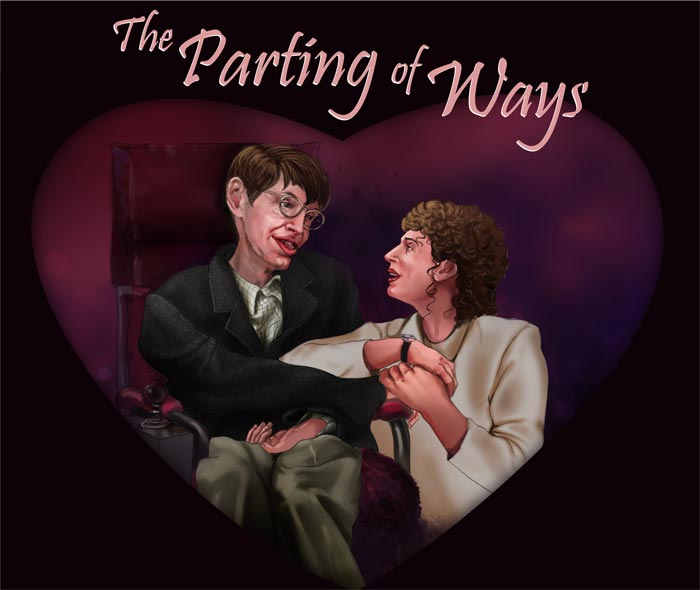
On the domestic front, Jane decided that they now had enough money to buy a second house. Stephen wanted to buy a property in Cambridge but Jane dreamed of buying an old farmhouse in France and renovating it. She along with Timothy, travelled to France where she fell in love with an old mill house which she named ‘The Moulin’. Unknown to Jane, this house would soon become her haven in the midst of the personal storm that was about to break loose around them. With the international success of his book, Stephen Hawking had become a household name. Wherever he went, people treated him like a celebrity. Jane observed that so much attention was gratifying and disturbing at one and the same time. Fame came with its own set of problems one of which was the constant influx of would-be physicists to the family home to have a word with Stephen. One caller even proposed marriage to Lucy on the condition that her father read his thesis.
Stephen was named one of the ‘Twenty-Five Most Intriguing People’ of 1988 by People magazine. Accolades came from official quarters as well. He was given an honorary doctorate in science by the University of Cambridge in 1989. Also, Queen Elizabeth named him a Companion of Honour, a title ranking above even a knighthood. Fame did not seem to bother Stephen and he shrugged of comparisons between himself and Albert Einstein but Jane was distraught by the constant media attention and exclaimed, “Nowadays I was there to appease the media desire for comforting personal detail (about Stephen’s life) by performing like a well-behaved circus animal.” She would actively fight back against the fabrications put forth by the media. She worried that the other disabled families would be negatively perceived and censored that they did not live up to the heroism of the Hawkings.
But the façade of a perfect life was soon to be rudely shattered. Stephen had fallen in love with one of his nurses, Elaine Mason.
Jane, for her part, was ready to accept this relationship in the same way that Stephen had accepted her relationship with Jonathan with the proviso that they remain discreet, it does not affect their family and children and that it does not negate her relationship with Stephen. However, this was not to be; in October 1989, the Physicist presented Jane with a letter of intent proclaiming his intention to leave her and move in with Elaine. The press did not get to know about the separation until the summer of 1989 and then all hell broke loose. Jane described the reporters ‘clustering around the gates, like a pack of baying hounds…We were being hunted.’ Rumours abounded about infidelity and religious differences. But why such shock and disapproval if the Hawkings had separated? After all, such things were common and the divorce rates among the disabled were even higher than among the general population. Then why the outrage? The problem was that the Hawkings had attained a legendary status and people everywhere thought them to be above the frailties of mere mortals.
One unfinished business from the past still remained to be settled. It had been over 15 years since Stephen’s bet with Kip Thorne regarding whether Cygnus X.1 was a black hole or not. Odds against his winning were rising as new evidences kept coming in. In June 1990, while Kip was away in Moscow, Stephen broke into his office along with his staff, found the framed bet, and wrote a concessionary note on it with validation by Stephen’s thumbprint. Stephen said, “…there is now so much other observational evidence in favour of black holes that I have conceded the bet. I paid the specified penalty, which was a one year subscription to Penthouse, to the outrage of Kip’s liberated wife.” In 1991, friend Kip Thorne and his graduate students were researching on the existence of wormholes. These are tunnels that connect two different regions of space-time in one universe or two universes to each other. If such things as wormholes existed, it would allow humans to travel in space as well as in time. After much research, Kip concluded that creation of a wormhole machine was not possible currently but there were still hopes that a more advanced society might just succeed in creating such a time machine.
However, Stephen flatly disagreed with Thorne who clarified that “There is little politeness in our community when one of us believes the other is wrong.” The professor created the chronology protection conjecture which said that the laws of nature prevent the appearances of closed time like curves. With his wry sense of humour he stated that “there seems to be a chronology protection agency which protects the appearance of closed time like curves and so makes the universe safe for historians”. He added, “the best evidence we have that time travel is not possible, and never will be is that we have not been invaded by hordes of tourists from the future.” For Kip’s 60th birthday, Stephen calculated the probability of a working wormhole time machine and arrived with a probability of 1 part in 10 60.8.
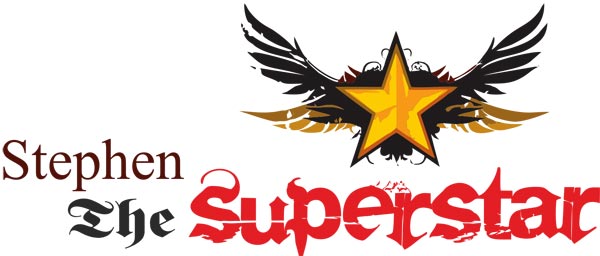
The name Stephen Hawking had attained an iconic status, one proof of which was the movie version of ‘A Brief History of Time’ which premiered on August 14, 1992.
When it started out, Stephen made it clear that the movie should be more like the book and must focus on science and not the scientist. But the movie eventually turned out to be part biography. Although some criticized the blatant omission of Stephen’s separation from Jane in the movie, it was overall highly acclaimed. Stephen himself did not seem to mind the fact that it had turned out to be quite biographical and even thanked the director Morris for turning his mother into a movie star. But this was just Stephen’s first step into the realm of entertainment. Soon, he appeared as a holographic version of himself in one of the episodes of ‘Star Trek: The Next Generation’ where he played poker with holographic versions of Albert Einstein and Isaac Newton.
His computerised voice (with credit) also appeared in the song ‘Keep Talking’ by Pink Floyd. In 1993, the Physicist’s second popular level book titled ‘Black Holes and Baby Universes and Other Essays’ was released which was considered by far to be a much easier read than ‘A Brief History of Time.’
Stephen and Jane were finally divorced in the spring of 1995 and Jane set off to Seattle to spend some time with her eldest child Robert who was working there with Microsoft. Meanwhile, the press was digging its nose into Stephen’s private life yet again and were questioning Elaine’s motive for marrying Stephen. Some said it was motivated by the fortune that the Physicist had amassed through royalties from A Brief History of Time. Indifferent to the media, Stephen went ahead and married Elaine in a private civil ceremony on September 16, 1995. It was at this time that Jane who had been pondering on writing a book about her life, set to work on her autobiography.
In November 1996, ‘The Illustrated A Brief History of Time’ was released; the text was livened by coloured illustrations and photographs and apart from some revisions, it also contained an added chapter on wormholes and time travel. In March 1997, daughter Lucy made a surprising announcement; her family was informed that she and her boyfriend Alex Mackenzie Smith, a member of the United Nations Peace Corps in Bosnia were expecting a child and that they would be living together in London. On July 4, 1997, Jane and Jonathan were married. Some months later, Lucy gave birth to her parent’s first grandchild, William. In the meantime, Stephen’s television debut on Star Trek paved the way for other roles. He appeared in a 1999 episode of The Simpsons ‘They Save Lisa’s Brain’. He also appeared in the comic strip Dilbert as well as in Futurama, an animated science fiction sitcom. In early 1999, he went through an operation of his larynx to ensure that food would not fall down the wrong pipe and into his lungs.

In August 1999, Jane’s autobiography ‘Music to Move the Stars – A Life with Stephen Hawking’ was released. The book created a lot of uproar and the media went wild perceiving it to be a ‘tell all’ about the life of the world’s most famous scientist. Stephen himself remained silent as he claimed that he did not read biographies of himself. The wild public interest in Jane’s autobiography shows just how much the word Stephen Hawking had become ingrained in public consciousness. Stephen had become a force to reckon with. In spite of all this negativity, he did not shy away from the media glare. In 1999, in an interview with CNN’s Larry King he was asked how he planned to spend New Year’s Eve.
In trademark Hawking style he replied that he was going to have a Simpson’s character party and the best part was that he could go as himself. Meanwhile, the Cambridge University was benefitting hugely through its association with Stephen Hawking. By 2000, they had a brand new, $177 million building with a swanky wheelchair accessible office for Stephen. He continued to use his status for the benefit of the disabled. To raise public awareness of the technology available for the disabled, he displayed his new Quantum Jazzy 1400 which was provided to him by Pride Mobility, the world leader in mobility products.

He compared it to a Ferrari and added that it “will also keep my nurses fit as they try to keep up.” His tailor made license plate read: T4SWH (Tea for Stephen W. Hawking) – a tribute to his favourite drink.
Amongst all his other activities, the professor managed to find time for his children. He enjoyed Formula One racing and music concerts with his younger son Timothy. His daughter Lucy adored his father’s uncanny ability of buying her gifts of beautiful clothes which invariably fit perfectly. She added that it “means more to me that he knows what size I am, and not just what size galaxies are.” Stephen had become the darling of the media and the general public. Everything that he said was eagerly lapped up by the public. He had become science’s unofficial spokesman. In 2001, he told German magazine ‘Focus’ that humans will have to modify their DNA so as to keep up with the computers, else there was a significant chance that intelligent machines will take over the world. Another time, he said that humans must start creating space colonies so as to ensure their own survival.
Stephen had won over the public but the clan of scientists thought differently. In a poll by the Physics World magazine as to who was the top scientist of all time, most physicists rooted for Einstein who received 119 votes whereas Stephen received one. In another survey by Physics Web, Isaac Newton was ranked first while Hawking lagged behind at 16. Peter Coles, an astronomy professor at the University of Nottingham puts it interestingly as “coffee time talks in Physics departments often come up with the same topic: it’s very difficult to get anybody to say anything critical of him. But to have somebody like that in an establishment that runs on peer review isn’t healthy. The trouble is, people fear that they will be thought of as jealous.”
The success of A Brief History of Time made many people clamour for a sequel. At that time, Stephen wanted to focus on his research and so the book remained unwritten. With the start of the 21st century, however, it dawned on him that there is room for a different kind of book that might be easier to understand. With this in mind, he started work on a new book which he called ‘The Universe in a Nutshell’.
Learning from his past experience, he decided to arrange the book into independent, separate topics which could be read in any order. The book was launched in Munich, Germany in October 2001. The book became a bestseller though it was not as big a success as its predecessor. In June 2002, Stephen was awarded the Aventis Book Prize for distinction in popular science writing. The prize came as a surprise to him and he said, “my previous book did not win any prizes, despite selling millions. But I am very pleased to have had better luck this time.”

On January 8, 2002, Stephen celebrated his sixtieth birthday; a remarkable feat for someone expected to die ever since he grew up. Stephen had now become the British record holder for survival. Long-term friend and colleague Robert Penrose declared that the physicist had officially become an old man and now could get away with saying such outrageous things. A massive celebration was held, which included Stephen’s current and past graduate students and also his ex-wife. Jane was especially pleased to be involved and said, “because I still think that, with the exception of our children, the greatest achievement of my life was helping keep him alive.” But Stephen almost couldn’t attend this celebration. Just after Christmas, he had an argument with ‘a wall’ and ‘the wall won.’ While travelling on a cobbled street, he lost control of his wheelchair and crashed into a wall.
This year also saw the publication of another Stephen Hawking book, ‘On the Shoulders of Giants’ which contained biographies of scientific big-wigs Copernicus, Galileo and Newton along with extracts of their major works.
That April, Stephen told a reporter “I suggested we might find a complete unified theory by the end of the century.” He laughingly added “Ok I was wrong”. He revised his prediction then and said that “there’s a 50-50 chance that we will find a complete unified theory in the next 20 years.” However, several months later at a talk at Cambridge he said, “Maybe it is not possible to formulate the theory of the universe in a finite number of statements…Some people will be very disappointed if there is not an ultimate theory that can be formulated as a finite number of principles. I used to belong to that camp, but I have changed my mind.” Once again Stephen had proved that he was not afraid to own up if he was wrong.
Meanwhile, the television appearances continued and in spring 2003, Stephen appeared in the television show ‘Late Night with Conan O’Brien’ along with Jim Carrey.
The public curiosity about Stephen refused to be sated and in April of 2004, BBC premiered its television drama ‘Hawking’.
The movie narrated the two years in Stephen’s life when he was diagnosed with ALS, met Jane and conducted his thesis on singularity theorems. Ex-wife Jane noted that the movie captured “the sense that we had that, despite it all, everything was going to be possible.” As expected, the movie was much liked and received viewership of more than four million. The author in Stephen was working overtime as well and in 2005, the book ‘A Briefer History of Time’ was released which was jointly written by Stephen Hawking
and author-physicist Leonard Mlodinow. The book provided an abridged yet clear picture of the universe to the average reader.
2006 was a year marked with a major personal disturbance. Stephen got divorced from his second wife Elaine. The 11 year marriage had always been under the public scrutiny and dogged by accusations that Elaine physically abused her wheelchair bound husband. Twice, criminal investigations had been launched by the police after Stephen received unexplained injuries which included broken bones, but on both the occasions the professor remained non-committal and the inquiries had to be dropped. Ex-wife Jane claimed that Elaine had intentionally driven a wedge between her and Stephen while many friends claimed that the nurse had ‘brainwashed’ her patient. The grounds for the divorce remained a mystery; Stephen chose not to comment on his divorce and the only statement from Stephen’s camp was that “He is far too busy. This is just a distraction which is really annoying. We don’t have time for any of this.”
The unpleasantness of 2006 was soon forgotten and in 2007, the author-physicist was back with his first book for children ‘George’s Secret Key to the Universe’ co-authored with daughter Lucy and Christophe Galfard, a former research student of his. The book which was an adventure story explained the mysteries of the universe in a way which could be understood by children. The book received favourable reviews and was followed by ‘George’s Cosmic Treasure Hunt’ in 2009 and ‘George and the Big Bang’ in 2011.
On Thursday, April 26, 2007, the intrepid physicist charted another first by becoming the first person with a disability to experience zero gravity in a flight. Before the flight he told reporters that “I have wanted to fly in space all of my life….for someone like me whose muscles don’t work very well, it will be bliss to be weightless.” Florida based Zero Gravity Corp which runs such flights, offered it to Stephen Hawking as a courtesy. The zero gravity flight is dubbed as the Vomit Comet by NASA astronauts because of its tendency to make one retch due to its stomach churning manoeuvres. In anticipation, Stephen was given a pre-flight motion sickness pill and was also attended by two doctors and three nurses. It was decided that the professor have a single zero gravity run but they needn’t have feared; Stephen lapped up the experience and at his insistence the dives were extended to a total of eight. An apple was floated free in the aircraft along with Stephen as a tribute to Isaac Newton. Peter Diamandis, Chairman of Zero Gravity told about Stephen “he was doing gold medal gymnastics in zero-g. It was incredible…his eyebrows went up and there was a big grin…he was grinning the entire time.” After the flight, Stephen said “It was amazing. The zero-g bit was wonderful….I could have gone on and on. Space, here I come.”

In March 2008, Stephen featured in the documentary television series ‘Stephen Hawking: Master of the Universe’ produced by television broadcaster Channel 4.
The series consisted of two 48 minutes episodes dealing with his life and work. The series was a huge success and commanded viewership of more than 1.5 million viewers. In September 2010, Stephen returned to the public eye with the release of yet another of his controversial offerings, this time, the book ‘The Grand Design’. Co-authored by Stephen and Leonard Mlodinow,
the book delved on the controversial topic of the existence of God. As per the book, it was not necessary to resort to the concept of God to explain the origins of the universe; Big Bang was a direct derivation of the laws of Physics. In response to criticism of the book, Stephen countered, “One can’t prove that God doesn’t exist, but science makes God unnecessary.” The authors added, “Because there is a law such as gravity, the universe can and will create itself from nothing. Spontaneous creation is the reason there is something rather than nothing, why the universe exists, why we exist. It is not necessary to invoke God to light the blue touch paper and set the universe going.” Despite the criticisms, the book was a success.
A self-confessed atheist and never afraid of speaking his mind, Stephen likens human brain to a computer. In an interview in May 2011, he stated “I regard the brain as a computer which will stop working when its components fail. There is no heaven or afterlife for broken down computers; that is a fairy story for people afraid of the dark.” In October, the flamboyant professor was on TV once again, this time in a science documentary series titled ‘Brave New World with Stephen Hawking.’
The series focused on scientific breakthroughs which had the potential to transform our world. It also touched on the theme of space exploration as the only hope of survival for human beings in the future. Before the series’ premiere Stephen warned, “We are entering an increasingly dangerous period of our history…But our genetic code still carries the selfish and aggressive instincts that were our survival advantage in the past. It will be difficult enough to avoid disaster in the next hundred years, let alone the next thousand or million. Our only chance of long-term survival is not to remain lurking on planet Earth, but to spread out into space.” On the same subject he added, that if there is intelligent life out in the universe, maybe we have been overlooked by it. “If we should pick up signals from alien civilizations” he cautions “we should be wary of answering back, until we have evolved more.’ He believes that meeting a more advanced society at this stage “might be like the original inhabitants of America meeting Columbus. I don’t think they were better off for it.”
On January 8, 2012, the poster boy for I.M.Possible celebrated his 70th birthday. A public symposium was held at Cambridge University on the occasion but unfortunately Stephen couldn’t attend it due to ill health. A recorded speech of the physicist was played at the event instead which was attended by the world’s leading cosmologists. In his speech, the professor talked about his childhood and the highlights of his career. He finished the speech to a standing ovation from the audience
with the words “Our picture of the universe has changed a great deal in the past 40 years and I’m happy if I’ve made a small contribution. The fact that we humans – who are ourselves mere collections of fundamental particles of nature – have been able to come this close to an understanding of the laws governing us and our universe is a great triumph.”
Meanwhile, the master of the universe is fast becoming a master actor as well. In April 2012, the professor made another of his celebrated guest appearances on television, this time on the popular sitcom ‘The Big Bang Theory’.
According to his co-star Simon Helberg, Stephen’s comic timing is quite good. He displayed his comic genius once again in July when he held a party for time travellers but did not send out the invitations till after the party. The professor sat waiting for his guests to come complete with balloons and champagne but unfortunately no one turned up. In an interview to Ars Technica, a technology news and information website, Stephen said about his party “I have experimental evidence that time travel is not possible.”
In July, Stephen, whose only vice is that he occasionally gambles, was in the news again, this time for a wager made 10 years ago on the Higgs particle or the ‘God particle’ as it is sometimes called. The Physicist had made a $100 bet against fellow scientist, Gordon Kane, that such a particle will never be found. But with news coming in July from scientists in Geneva that the elusive particle has almost been hunted down, he cheerfully conceded the bet. Stephen was pleased that the Higgs particle had been discovered and recommended Peter Higgs, the man who gave his name to the Higgs boson particle, for a Nobel Prize. In typical Hawking style he joked that the discovery had cost him $100!

So, finally what does one make of Stephen Hawking – the living legend? Has Cosmology become famous because of Stephen Hawking or does the cosmologist owe his fame to science? Difficult to answer but perhaps it’s a bit of both. A fact which cannot be denied though is, that there is no other scientist quite as famous, as appealing, as interesting, as mysterious as Stephen W. Hawking. And how could it be any different? Courage, fortitude, perseverance, determination, humour and a dash of stubbornness…Stephen has them all.
The professor loves to teach science to people but there are many valuable lessons which can be learned from his life as well. The fact that he is alive is in itself worth a salute. It teaches us to live life in the present and make the most of our time on this earth. That is the motto by which Stephen lives his life to seek the greatest value of our action. The normalcy which he exudes is uncanny – a wheelchair bound man who cannot speak, write, walk or even eat on his own, is doing brilliantly in his field of work and is a father and grandfather as well.
Stephen Hawking makes us redefine our perceptions about courage. A soldier fighting at the battlefield or an activist fighting for social issues are indeed men of valour. But fighting the unknown every single day, not knowing whether this would be your last breath and yet being a brilliant scientist takes bravery of a different kind. Ever played dumb charades? Remember how difficult it gets to express what we want to say without the comfort of speaking out? Now imagine not being able to talk throughout your life, not even the use of your hands to express yourself. Imagine having only your cheek muscles to select for communicating, for selecting words from a whole dictionary on the computer. Imagine that it takes you a whole twenty minutes to reply to someone. Imagine the way Sir Hawking communicates….by sheer grit and determination. What’s more, just think of the amount of perseverance that the man possesses to churn out book after book with only the aid of his cheek muscles!
The professor’s quirky sense of humour is well-known. Not for him the character of a gruff and stuffy old gentleman. People who know him describe him as an incurable flirt and a party animal who loves to dance in his wheelchair.
Battling such a life threatening disease and yet not being melancholy and gloomy…now that’s strange. Twice married, when asked what he thinks about the most throughout the day, bang comes the reply – women, who are in Stephen’s eyes, a complete mystery. Indeed, the man is every bit as remarkable as his ground-breaking work. What better way to end this than with a quote of Mr. Hawking
“Remember to look up at the stars and not down at your feet…Try to make sense of what you see and about what makes the universe exist. Be curious. And however difficult life may seem, there is always something you can do, and succeed at. It matters that you don’t just give up.”
Brave words from a brave man…let’s each of us try to live up to them.
Next Biography





